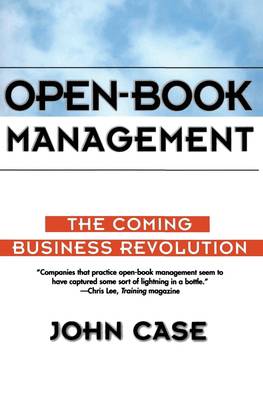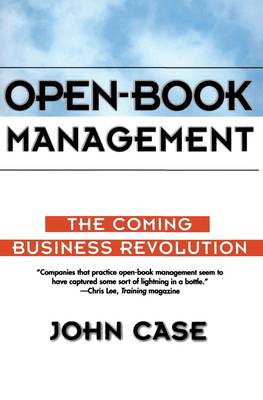
- Retrait gratuit dans votre magasin Club
- 7.000.000 titres dans notre catalogue
- Payer en toute sécurité
- Toujours un magasin près de chez vous
- Retrait gratuit dans votre magasin Club
- 7.000.0000 titres dans notre catalogue
- Payer en toute sécurité
- Toujours un magasin près de chez vous
Description
"Companies that practice open-book management seem to have captured some sort of lightning in a bottle." -- Chris Lee, Training
"This book should be required reading in corporate America." -- Chicago Tribune
"If you want to give your preconceived notions a good kick in the you-know-where, give Case the opportunity to articulate the merits of open-book management." -- Entrepreneur
Open-book management is not so much a technique as a way of thinking, a process that actively involves employees in the financial life of the company. Numerous companies have already found that employees who are informed and aware of the company's financial situation are motivated to seek solutions to problems and assume a greater degree of responsibility for its performance. John Case begins by examining the current competitive climate and the history of established management techniques. He shows how the traditional treatment of workers as "hired hands" with little involvement or responsibility beyond their own area is no longer effective in today's ever more competitive global environment.
Case clearly and carefully explains the principles of open-book management: timely sharing of crucial financial information with employees; educating the employees to understand and apply the information; empowering employees to apply the information to their own work; and offering employees a stake in the successful implementation of their ideas. Open-book management will take different forms at every company, Case notes, but he offers a wide range of suggestions and guidelines for implementing these principles. He concludes with a series of in-depth case studies, featuring companies of various sizes and financial situations that have successfully implemented open-book management. Open-Book Management is the indispensable guide to teaching employees how to think and act like owners.
Spécifications
Parties prenantes
- Auteur(s) :
- Editeur:
Contenu
- Nombre de pages :
- 224
- Langue:
- Anglais
Caractéristiques
- EAN:
- 9780887308024
- Date de parution :
- 12-04-96
- Format:
- Livre broché
- Format numérique:
- Trade paperback (VS)
- Dimensions :
- 136 mm x 183 mm
- Poids :
- 204 g

Les avis
Nous publions uniquement les avis qui respectent les conditions requises. Consultez nos conditions pour les avis.






